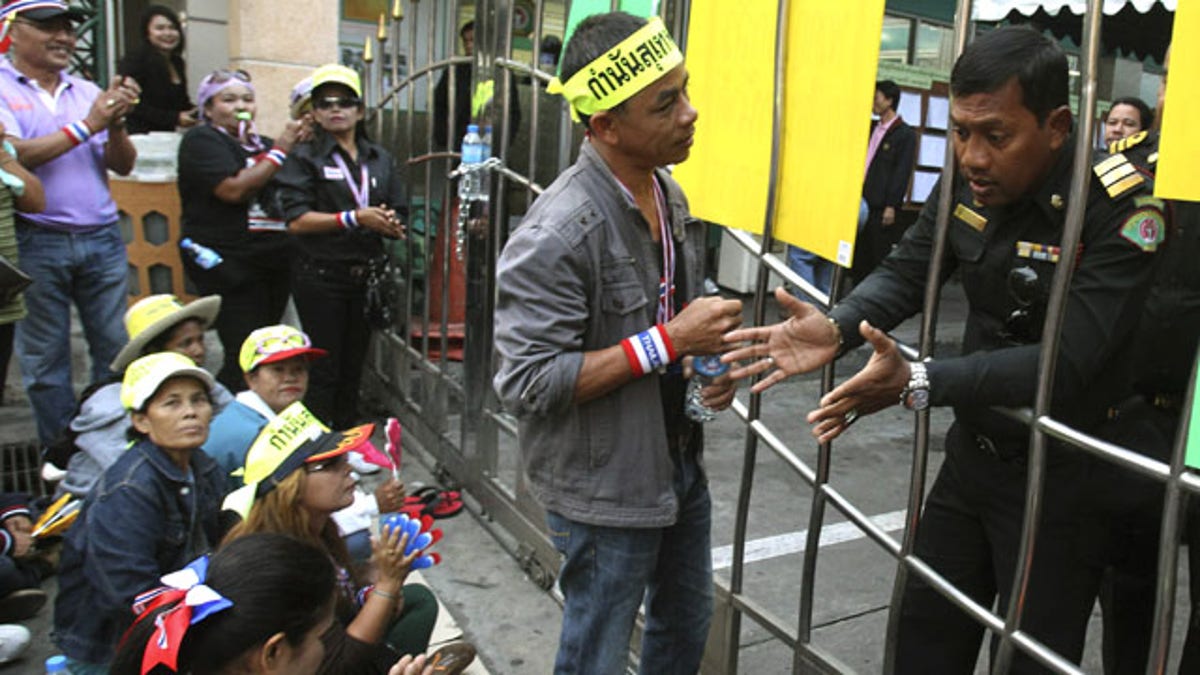
January 26, 2014: Anti-government protester talk to an election officer while gathering in front of a polling station in Patumwan district during a rally in Bangkok, Thailand. (AP Photo/Sakchai Lalit)
BANGKOK – Anti-government demonstrators swarmed dozens of polling stations in Thailand on Sunday to stop advance voting for next week's general elections, chaining gates shut, threatening voters and preventing hundreds of thousands of people from casting ballots.
A protest faction leader was fatally shot in a confrontation near a voting center that also left 11 people wounded, the city's emergency services said, and isolated street brawls broke out in several parts of Bangkok.
The chaos underscored the precariousness of Thailand's fragile democracy, and the increasing weakness of Prime Minister Yingluck Shinawatra's elected administration. Yingluck had called the Feb. 2 vote in a failed bid to ease months of street protests, but police did not disperse the crowds because of longstanding orders to avert violence, which many fear would give the all-powerful army reason to stage a coup.
"It's a sad day for democracy when the right to vote ... is assaulted by a political movement that claims to be striving for reform and people's empowerment," Sunai Phasuk, a senior researcher at Human Rights Watch, said of the protesters. "Everything that happened today shows they are striving for the opposite."
Sunai, who was also unable to vote, said that demonstrators forcefully intimidated would-be voters, and in at least one case attempted to strangle a man. Demonstrators were also targeted -- gunmen opened fire on a group attempting to block polling near a temple, killing faction leader Sutin Tharatin while he was giving a speech on the back of a truck.
Although most polling stations in Bangkok and many in the opposition stronghold in the south were forced to close, voting proceeded largely unhindered in the rest of the country. Still, the upheaval proved that demonstrators struggling to overthrow Yingluck have the ability to disrupt the main vote next week, and the country's electoral commission is unlikely to stand in their way.
The commission, which agrees with protesters that the poll should be delayed, is legally mandated to ensure registered voters are able to cast ballots safely. But on Sunday, its members "just sat down and watched this thing collapse around them," Sunai said.
The commission is supposed to be neutral, but critics have accused its members of taking sides. Its top executive, Somchai Srisutthiyakorn, has posed for at least one smiling photo with demonstrators, and its officials failed to denounce a violent effort by protesters to disrupt candidate registration in December.
On Sunday, the commission issued no public condemnation of attempts to derail voting. Analysts say that is because courts and the country's independent oversight agencies are largely aligned against the current government in collusion with the army, royalists and powerful businessmen.
Somchai insisted he had requested security reinforcements for polling stations on Thursday, rebutting accusations by Labor Minister Chalerm Yubumrung that he had never asked for help, the Thairath newspaper reported. Chalerm heads a special command center set up to oversee security under a state of emergency decree announced last week.
The protesters, a minority that cannot win power at the polls, are demanding Thailand's democracy be put on hold. They want Yingluck's government replaced by a non-elected "people's council" that would implement anti-corruption reforms before elections. They accuse her of corruption and allege the ruling party has employed its electoral majority to subvert democracy.
Much of their hatred is directed at Yingluck's family. They say she is a puppet of her billionaire brother Thaksin Shinawatra, an exiled former premier they allege used the family fortune and state funds to influence voters. Thaksin was ousted in a 2006 coup that provoked a struggle between that in broad terms pits Thailand's rural north against an urban elite backed by royalists and the south.
The protest movement, known as the People's Democratic Reform Committee, had pledged not to obstruct Sunday's poll. Protest spokesman Akanat Promphan told The Associated Press that those who had locked the gates of polling stations had "acted on their own," but he did not criticize them and said the decision to close stations was made by Election Commission officials.
The protesters' effort, however, appeared to have been widely coordinated. Across Bangkok, demonstrators waving the Thai flag physically blocked electoral officials, ballot boxes and voters from getting inside polling centers. Some did vote -- one woman climbed over a padlocked gate to try to do so -- but officials ultimately shut polling stations in 83 of the nation's 375 constituencies, authorities said.
Suthida Sungkhapunthu, a 28-year-old office worker, said she turned back from one polling station after reading news of the day's mayhem on her phone.
"I saw this coming but I'm still quite disappointed," she said, calling the protesters "undemocratic" as she watched a mob surrounding her polling station a block away. "It's my constitutional right" to vote, she said.
International Federation for Human Rights president Karim Lahidji also said protesters had gone too far.
"Blocking citizens from exercising their voting rights is a serious violation of Thai laws and international human rights standards," he said. "The right to peaceful assembly must not infringe on the citizens' fundamental right to vote."
About 49 million of the nation's 64 million people are eligible to cast ballots in February, and 2.16 million applied for early voting. But even before Sunday, there had been increasing doubt that the main poll would go ahead next week. Even if it does, Parliament is unlikely to achieve the quorum it needs to convene, which would prevent a new government from being formed.
Ruling party officials suggested over the weekend that they were willing to delay next week's ballot, but only if protests end and the main opposition party abandons its boycott. There has been no sign yet that Yingluck's rivals would agree to any deal, however.




















